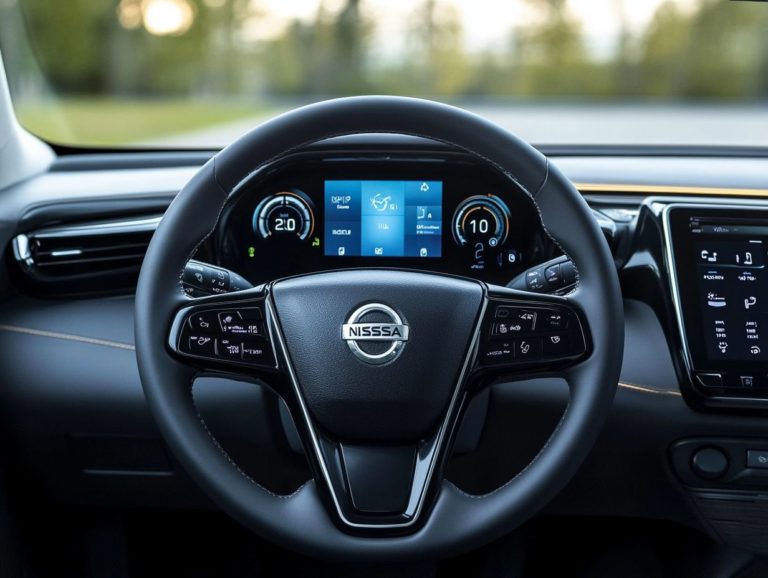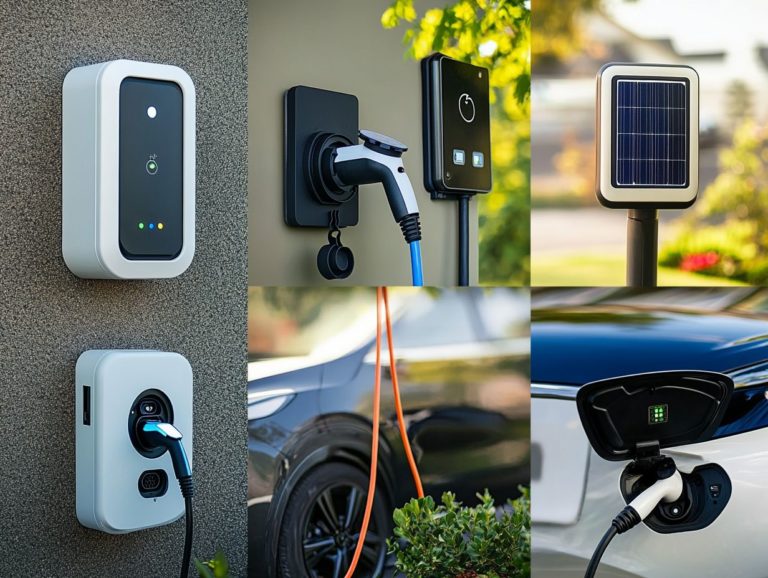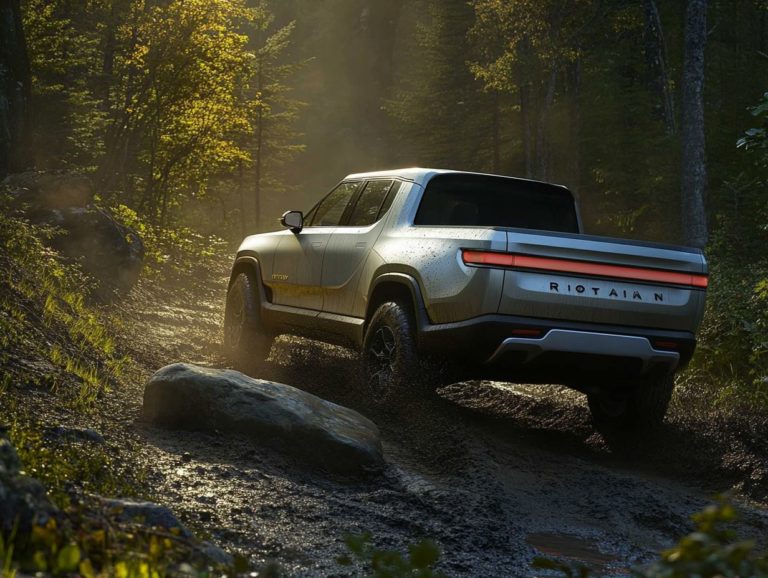The Best Electric Cars for College Students
Navigating college life can feel like a whirlwind, and selecting the right car shouldn’t contribute to that stress.
For students seeking budget-friendly, compact, and environmentally conscious options, electric cars are increasingly appealing. Let s explore the best electric vehicles that fit your college lifestyle!
This article delves into the best electric vehicles tailored specifically for college students, emphasizing key factors such as affordability, maneuverability, range, tech features, safety, maintenance costs, resale value, and insurance rates.
Find out how these innovative cars can change your college experience today!
Contents
- Key Takeaways:
- 1. Affordable Options for College Students
- How Do These Cars Compare to Traditional Gasoline Cars in Terms of Cost?
- 2. Compact and Easy to Drive
- What Are the Best Compact Electric Cars for College Students?
- What Features Make These Cars Easy to Drive?
- 3. Range and Charging Time
- 4. Tech-Savvy Features
- 5. Environmental Impact
- 6. Safety Features
- 7. Maintenance and Repair Costs
- 8. Resale Value
- 9. Insurance Rates
- Frequently Asked Questions
- What are the benefits of owning an electric car as a college student?
- What are some key features to look for when choosing the best electric car for college students?
- Which electric cars are the best for college students on a budget?
- Are there any electric cars that offer a longer range for college students who often travel long distances?
- Do electric cars require regular maintenance like traditional gasoline cars?
- Can college students find charging stations easily for their electric cars?
Key Takeaways:

- There are affordable electric car options available for college students, with pros and cons to consider compared to traditional gas cars.
- Compact electric cars make campus navigation easy, featuring small sizes and easy handling.
- Electric cars with a longer range and faster charging time are ideal for college students, with convenient charging options available on campus.
1. Affordable Options for College Students
For college students like you seeking budget-friendly transportation, affordable electric vehicle (EV) options present a smart choice that perfectly balances cost and functionality.
Models such as the Kia Niro, Nissan Leaf, and Chevrolet Bolt are ideal for navigating university campuses without putting a strain on your finances.
These vehicles not only come with a reasonable initial purchase price but also offer low maintenance costs compared to traditional gas-powered models. This makes them particularly appealing for students on a budget.
When you compare these EVs to typical used cars in the market, the advantages stand out even more, especially in terms of reliability and reduced environmental impact.
Having access to EV charging stations on campus is crucial for you. It provides a convenient spot to recharge while easing concerns about running out of battery throughout long days filled with classes and extracurricular activities.
This infrastructure supports a sustainable lifestyle, reinforcing the idea that affordable electric vehicles are not just a luxury but an essential resource in modern college life.
Affordable Choices
The market is teeming with budget-friendly electric cars perfect for college students. Models like the Kia Niro, Nissan Leaf, and Chevrolet Bolt offer excellent value without skimping on features or efficiency.
These vehicles deliver impressive mileage on a single charge and come packed with modern technology that elevates your driving experience.
For those on a tight budget, the low maintenance costs and enticing federal tax incentives make these electric options even more appealing.
Unlike traditional gasoline vehicles, these cars often qualify for reduced registration fees and local subsidies, leading to substantial savings over time.
Navigating campus or commuting to classes doesn’t have to break the bank, freeing up your funds for essentials like tuition or textbooks.
What Are the Pros and Cons of These Affordable Options?
Evaluating the pros and cons of affordable electric vehicles offers you valuable insights, especially if you re a college student managing both low operating costs and challenges like limited range and charging infrastructure.
With fuel prices on the rise and growing environmental concerns, you might find that electric vehicles can significantly trim your monthly expenses.
However, it s crucial to weigh this attractiveness against factors like range anxiety the worry about running out of battery on your trip, which might make you hesitant about longer trips.
While these vehicles typically require less maintenance than traditional combustion engines, their resale value might not have hit the sweet spot just yet. This makes it essential for you to research market conditions and the availability of local EV charging stations, which can vary widely depending on your region.
Ready to choose your ideal electric vehicle? Start your research today!
How Do These Cars Compare to Traditional Gasoline Cars in Terms of Cost?
When you compare the cost of electric vehicles with traditional gasoline cars, you’ll discover that the long-term savings on fuel and maintenance make electric cars a much more appealing option.
In today’s market, gasoline prices can weigh heavily on your finances, especially if you’re on a tight budget. Electric vehicles generally offer much lower operating costs because charging them is often more economical than refueling with gasoline.
Electric cars usually require less maintenance due to fewer moving parts and reduced wear on engines. You might also be eligible for various government incentives or rebates designed to encourage greener transportation options. This means you can save money while driving an awesome car!
2. Compact and Easy to Drive
Compact electric cars, like the Mini Cooper and VW e-Golf, are the ideal fit for college students. They are easy to drive in congested university areas while exuding a stylish hatchback design that perfectly balances form and function. For those considering longer journeys, exploring the best electric vehicles for road trips can also be beneficial.
These vehicles are made for urban environments, making them exceptional for navigating tight spaces and slipping into smaller parking spots where larger cars might feel unwieldy. Bigger electric models often lack the ease needed for quick turns and short approaches on campus.
With their hatchback design, these cars provide ample cargo space for your books, groceries, or even sports equipment, transforming them into versatile companions for your student life. The blend of size, style, and practicality makes these compact electric cars a superb choice for busy students.
What Are the Best Compact Electric Cars for College Students?
When considering compact electric cars that are perfect for college students, the Nissan Leaf, Hyundai Kona, and Mini Cooper are exceptional choices, showcasing practicality and efficiency.
These vehicles deliver impressive range and energy savings while possessing the ease needed to navigate campus parking spots and bustling city streets.
The Nissan Leaf is known for its spacious interior and user-friendly technology, making it an ideal companion for students juggling textbooks and hectic schedules. The Hyundai Kona combines style with functionality its compact design ensures easy driving while still offering ample cargo space for spontaneous weekend getaways.
Let s not forget the Mini Cooper, which provides a fun driving experience with trendy aesthetics, effortlessly capturing the attention of fellow students as it zips around campus.
What Features Make These Cars Easy to Drive?
The features that make electric cars easy to handle include a compact design, responsive handling, and cutting-edge technology especially beneficial for college students navigating tight campus environments.
These cars can turn sharply, so you can easily navigate tight spots without the anxiety of scraping against surrounding barriers. Visibility is excellent thanks to innovative designs, enabling you to easily spot pedestrians and cyclists, which is crucial in bustling college areas.
Many compact electric cars come equipped with features that help you drive safely, like automatic parking and lane-keeping assistance, making it a stress-free experience to navigate crowded spaces. These features work together to transform your daily commutes into seamless journeys, perfect for busy students.
Ready to go electric? Start your journey towards eco-friendly driving today!
How Do These Cars Compare to Larger Electric Cars?
When you compare compact electric cars to their larger counterparts, you’ll notice significant differences in ease of driving and parking convenience. The smaller options are particularly appealing for college students.
In bustling urban environments where space is often limited, navigating through traffic and finding parking can feel like an uphill battle. Compact models shine in this scenario, effortlessly sliding into tight parking spots that would leave their larger counterparts puzzled. This advantage drastically reduces the time you spend searching for parking and alleviates the stress of your daily commutes.
While enhanced maneuverability is a clear perk, larger electric vehicles have their own appeal. They offer more interior space and comfort, making them a better fit for families or anyone needing extra cargo room. Ultimately, your choice may hinge on your individual needs and lifestyle preferences.
3. Range and Charging Time
For college students, understanding the range and charging time of electric cars is essential. Vehicles like the Nissan Leaf, Chevrolet Bolt, and Hyundai Kona offer impressive driving ranges while enabling efficient EV charging right on or near campus.
These models are ready to power your daily adventures! They effortlessly meet your daily commuting needs, especially with the growing number of on-campus charging stations available. With many campuses now designating specific spots for electric vehicles, you can easily ensure that your car is charged during classes or study sessions at the library.
Home charging adds another layer of convenience, allowing for overnight recharging that maximizes efficiency. Thanks to advances in technology, many electric cars can regain a significant range in just a couple of hours. This development alleviates range anxiety, allowing you to focus on your studies without the constant worry of being stranded.
What Are the Electric Cars with the Best Range for College Students?
Electric cars such as the Nissan Leaf, Chevrolet Bolt, and Hyundai Kona are your go-to options for reliable transportation with impressive ranges. They are perfect for college students like you.
When you re juggling a packed schedule, these vehicles ensure you can efficiently navigate classes, part-time jobs, and social outings without the nagging concern of needing to recharge constantly. With ranges exceeding 200 miles on a single charge, you ll find yourself free to indulge in spontaneous weekend getaways or visit friends at other campuses. This allows you to slash fuel costs while embracing a more sustainable travel choice.
Plus, the convenience of home charging enhances their appeal, optimizing your time both on and off campus and ensuring your focus stays on what truly matters.
How Long Does It Take to Charge These Cars?

Charging times can differ greatly. Some cars, like the Nissan Leaf and Chevrolet Bolt, are designed for busy students. They offer fast-charging options that cater to your needs.
With the ability to reach an 80% charge in approximately 30 minutes using a quick charging station, these vehicles provide a level of convenience that allows you to juggle classes, part-time jobs, and social commitments without feeling tethered to a charging station.
Some models come with Level 2 charging options, enabling you to charge overnight at home. This adds both flexibility and peace of mind to your routine. As you navigate your daily schedule, the efficiency of these charging methods becomes a key factor in choosing the right electric vehicle.
Are you ready to explore the freedom of electric driving? Find your perfect electric car today and drive the change towards a sustainable future!
What Are the Options for Charging on Campus?
Colleges are stepping up by offering EV charging options on campus, allowing you to conveniently recharge your electric car, whether it s a Hyundai Kona or a Nissan Leaf, throughout the day.
This initiative not only nurtures a more sustainable environment but also eases any range anxiety you might feel if you rely on electric vehicles. The charging infrastructure is diverse, featuring Level 1, Level 2, and DC fast charging stations to meet your varying charging needs and schedules.
You can effortlessly find these stations through campus apps, making it a breeze to plan outings or study sessions without the nagging worry of running out of battery.
This development encourages a shift in mindset among students, promoting electric cars as a genuinely viable transportation option during your college years.
4. Tech-Savvy Features
Modern electric cars, such as the Tesla Model 3 and Chevrolet Bolt, boast cutting-edge safety features designed just for you! These vehicles are equipped with advanced connectivity options tailored to the needs of a digital-native generation.
You ll find these cars equipped with intuitive infotainment systems that work seamlessly with your smartphone, allowing you to access navigation, music, and hands-free calls with remarkable ease.
Unlike traditional gasoline vehicles that often offer limited connectivity, electric models frequently come with software updates delivered wirelessly, ensuring your tech stays ahead of the curve.
Safety technologies, including adaptive cruise control (which maintains your speed) and lane-keeping assist, along with automatic emergency braking, provide an extra layer of security essential for navigating the bustling campus life as a new driver.
The appeal of zero-emission driving resonates with environmentally conscious students, making it clear why these electric options are increasingly the preferred choice.
What Are the Best Electric Cars with Tech-Savvy Features for College Students?
The ideal electric cars for college students seeking tech-savvy features are the Tesla Model 3 and Chevrolet Bolt, both offering innovative technologies that elevate convenience and safety. For those interested in even more options, check out the best electric vehicles for tech lovers.
Each of these vehicles is outfitted with advanced driver-assist systems designed to create a safer driving experience, including automatic emergency braking and lane-keeping assistance.
The infotainment systems in these models are crafted for seamless integration with smartphones, granting you easy access to navigation, music, and communication apps.
Take the Tesla Model 3, for instance; it features a large touchscreen interface that controls most vehicle functions with just a tap. Meanwhile, the Chevrolet Bolt offers a user-friendly display that simplifies access to vital information.
These features not only enhance your driving experience but also ensure you stay updated and informed while on the road.
What Are the Features That Make These Cars Ideal for Tech-Savvy Students?
Electric cars designed for tech-savvy students are packed with features that elevate your driving experience think advanced connectivity, intuitive infotainment systems, and cutting-edge safety technologies.
Imagine having smartphone integration at your fingertips, allowing you to effortlessly access navigation, music, and communication tools right from your dashboard.
Some models even offer autonomous driving capabilities, giving you the luxury to unwind during your commutes or focus on your studies while on the go.
With enhanced safety features like lane-keeping assist and automatic emergency braking, you gain not only peace of mind but also a more secure journey.
In this way, electric cars become more than just a means of transportation; they transform into essential companions for the modern, tech-oriented student.
Check out these exciting electric cars that will transform your college experience!
How Do These Features Compare to Traditional Cars?
When you compare the tech-savvy features of electric cars to traditional gasoline vehicles, you’ll find that electric options excel in technology, safety, and usability. These features are tailored perfectly for today s college students.
Take the Tesla Model 3, for example. It boasts an intuitive interface that centralizes controls, making it easy for you to navigate and connect your devices. This level of connectivity keeps your car up to date with over-the-air updates, eliminating the need for dealership visits.
Safety features are front and center; advanced safety features provide real-time alerts that enhance your overall driving security. While traditional cars are reliable, they often fall short of these cutting-edge features that are not only convenient but essential for a tech-savvy and safety-conscious lifestyle.
5. Environmental Impact
Choosing an electric car, like the eco-friendly Nissan Leaf or Kia Niro, allows you to significantly reduce your carbon footprint. This promotes a sustainable lifestyle that positively impacts the environment throughout your college journey.
By opting for these energy-efficient vehicles, you embrace a greener alternative and actively contribute to the fight against climate change. As you navigate campus life and beyond, your choice leads to fewer greenhouse gas emissions, fostering cleaner air and a healthier planet.
Electric vehicles are essential in reducing reliance on fossil fuels. This transition brings long-term benefits, including lower maintenance costs, attractive tax incentives, and the chance to harness renewable energy sources, enhancing your environmental impact.
What Are the Most Eco-Friendly Electric Cars for College Students?
For students looking for eco-friendly transportation, electric cars like the Nissan Leaf and Kia Niro shine with their minimal environmental impact and sustainable features.
These vehicles do more than help reduce greenhouse gas emissions; they have energy-efficient designs that maximize battery performance. The Nissan Leaf offers an impressive range, allowing you to commute without constantly recharging.
The Kia Niro seamlessly blends electric power with hybrid technology, boosting fuel efficiency. Both models utilize recyclable materials in their interiors and produce them using renewable energy whenever possible.
This commitment to sustainability makes them perfect for environmentally conscious students who wish to make a positive impact while navigating campus life. Plus, with various incentives available for electric vehicle buyers, you can grab those financial perks on top of your eco-friendly choice!
How Do These Cars Help Reduce Carbon Footprint?
Electric cars present a remarkable opportunity for you to reduce your carbon footprint as a college student. By cutting down on harmful emissions typically associated with traditional gasoline vehicles, you champion sustainability.
Choosing to drive electric diminishes your personal environmental impact and contributes to a larger movement toward greener technologies. Electric vehicles play a crucial role in significantly lowering greenhouse gas emissions over time, especially when charged with renewable energy sources.
This reduction in air pollutants enhances public health. Cleaner air leads to fewer respiratory problems and elevates the overall quality of life for everyone.
Your decision to embrace electric transportation reinforces eco-friendly practices and creates a ripple effect that inspires others to join this vital environmental initiative. Join the green revolution and make a difference with your choice!
What Are the Long-Term Benefits of Choosing an Electric Car for the Environment?
Choosing an electric car can make a big difference, so let s explore the benefits today!
The long-term benefits of choosing an electric car go well beyond personal ownership. They significantly impact the environment and cultivate a culture of sustainability among college students.
This choice lowers greenhouse gas emissions. It also contributes to cleaner air and a healthier planet.
As more young individuals embrace electric vehicles, their collective demand can drive advancements in battery recycling technologies. This fosters a circular economy, a system where products are reused and recycled to reduce waste.
With the integration of renewable energy sources into charging infrastructures, a sustainable energy ecosystem emerges. This encourages others to shift towards eco-friendly alternatives. This transition ultimately nurtures a generation that prioritizes environmental stewardship, paving the way for a brighter, greener future.
6. Safety Features
Safety stands as a top priority for college students. Electric cars like the Kia Niro, Chevrolet Bolt, and Hyundai Kona are designed with high-tech safety features that protect you and provide peace of mind both on and off campus.
These vehicles also include multiple airbags, stability control systems, and modern driver-assistance technologies, such as lane departure warnings and automatic emergency braking. When you compare them to traditional gasoline cars, you’ll find that electric models often boast superior safety ratings.
This advantage stems from their lower center of gravity and the absence of a bulky engine, allowing them to absorb more impact during a collision. In essence, these electric vehicles are not just eco-friendly choices; they are among the most reliable options for students like you, maneuvering through busy campuses and bustling city streets.
What Are the Safest Electric Cars for College Students?

When you think about safety, electric cars like the Kia Niro and Hyundai Kona stand out as some of the best choices for college students. They re packed with high-tech safety features and boast impressive crash-test ratings.
These vehicles don t just excel in crash tests; they offer you and your passengers enhanced protection. They also come equipped with features like autonomous emergency braking, lane-keeping assist, and adaptive cruise control.
Such innovative safety systems are designed to reduce the likelihood of accidents, making them particularly suitable for the hectic and often distracting college environment you navigate every day.
Both models also feature spacious interiors and exceptional fuel efficiency, highlighting their practicality for young adults like you who are juggling study commitments, part-time jobs, and social activities.
What Are the Key Safety Features to Look for in an Electric Car?
Key safety features in electric cars, like automatic emergency braking and lane-keeping assist, are crucial for you as a college student prioritizing safety and reliability in your daily commute.
These modern technologies work in harmony to ensure a secure driving experience. This allows you to dedicate your attention to your studies rather than fretting over potential road hazards.
Automatic emergency braking anticipates collisions, applying the brakes to reduce impact a game changer when navigating busy campus roads.
Lane-keeping assist monitors your vehicle’s position within the lane and gently steers it back if you start to drift, significantly lowering the risk of accidents due to distractions or fatigue.
Together, these features do more than just enhance your personal safety; they instill a sense of confidence that s essential for managing the demands of both academics and social life.
How Do These Cars Compare to Traditional Cars in Terms of Safety?
Electric cars often have advanced safety technologies that enhance driver protection. This makes them an excellent choice for college students.
Features like automatic emergency braking and lane departure warnings improve your awareness on the road. Safety ratings from the National Highway Traffic Safety Administration show that many electric models consistently outperform gasoline vehicles.
Real-world data supports this, indicating lower accident rates for electric vehicles. Their low weight distribution enhances stability, giving both parents and students confidence in their choice.
7. Maintenance and Repair Costs
Evaluating electric cars means looking closely at maintenance costs. Models like the Tesla Model 3 and Hyundai Kona can significantly impact your ownership costs.
Electric cars typically have lower maintenance costs due to fewer moving parts. Plus, you won t need frequent oil changes, saving you even more.
Reliability is key for prospective buyers, and studies show electric vehicles often experience fewer breakdowns. As a college student, you ll appreciate these savings, helping you manage your budget more effectively throughout your academic journey.
What Are the Maintenance and Repair Costs for Electric Cars?
Maintenance and repair costs for electric cars, such as the Tesla Model 3 and Chevrolet Bolt, tend to be lower than those for traditional vehicles. This cost-effectiveness is due to having fewer moving parts, which reduces the chances of mechanical issues.
As a college student navigating tight finances, you would particularly benefit from the minimal maintenance requirements of these vehicles. They don t require oil changes or extensive transmission services, freeing up your time and money.
Incentives like tax credits and lower charging expenses enhance affordability, allowing you to funnel those savings into essential activities like tuition or textbooks.
With the expanding network of charging stations, you can conveniently power up your vehicle without the hassle of frequent trips to the gas station, making your life just a bit easier.
Are These Costs Significantly Different from Traditional Cars?
The maintenance costs for electric cars can vary from those of traditional vehicles, offering potential savings over time. Electric vehicles usually have fewer moving parts, which translates to lower maintenance costs.
However, be aware that components like the battery can be pricey to replace. In contrast, traditional cars incur regular costs for oil changes and repairs, which can quickly add up.
On the bright side, electric vehicles often enjoy government incentives and lower fueling expenses, which can help offset their potentially higher repair costs. Understanding these financial nuances is essential for you, especially if you’re a budget-conscious student eager to make informed choices about your transportation options.
What Are the Most Reliable Electric Cars for College Students?
For college students in search of reliable transportation, electric cars like the Tesla Model 3 and Hyundai Kona stand out as top contenders known for their dependability and low maintenance needs.
These vehicles deliver impressive range and performance while featuring cost-effective charging options that fit your budget-conscious lifestyle. Take the Model 3; it s renowned for its advanced features and stellar safety ratings, making it a smart choice for campus life.
The Hyundai Kona offers a compact design that excels in city driving and fits into those tight parking spots you often encounter around universities. Plus, both models help foster a more sustainable future, aligning perfectly with the values of environmentally conscious young adults.
8. Resale Value
The resale value of electric cars is crucial for college students. Understanding how models like the Kia Niro and Chevrolet Bolt maintain their value over time, along with factors that influence these trends, is essential.
For many students on a budget, investing in a vehicle that won’t depreciate rapidly can significantly impact financial planning. Evaluating how different brands perform in the market is wise; sought-after models typically hold their value better due to a solid reputation for reliability and performance.
The health of the battery, which affects performance and longevity, is also key; a well-maintained battery can elevate a car’s resale value. The rising demand for eco-friendly transportation options boosts the appeal and resale potential of electric cars, making them a compelling choice for future buyers.
Do Electric Cars Hold Their Resale Value Well?
Electric cars like the Kia Niro and Chevrolet Bolt are gaining traction in the resale market, making them appealing choices for college students mindful of their long-term investment.
This trend reflects a significant shift in how consumers view eco-friendly vehicles. As more people recognize their benefits, electric models are carving out a substantial niche in a market previously dominated by gasoline cars, holding their value thanks to robust demand, government incentives, and lower operating costs.
Luxury brands such as Tesla also stand out, often boasting impressive resale values that can surpass those of traditional models. Understanding which electric vehicles retain their value best helps you make informed financial decisions that benefit both your budget and the environment.
What Are the Factors That Affect Resale Value for Electric Cars?
Several factors impact the resale value of electric cars, including battery condition, market demand, and brand reputation. These elements are particularly relevant as you make long-term buying decisions in college.
As you consider such purchases, pay close attention to how rapidly technology is evolving in the electric vehicle sector; this can significantly influence future resale rates. What looks great now might lose value quickly if better models hit the market soon.
Regional incentives can also sway demand, so research local trends. Understanding the warranty coverage and service options available for electric cars will help you maintain their value over time, providing peace of mind as you navigate this investment.
What Are the Best Electric Cars for College Students in Terms of Resale Value?
The best electric cars for college students regarding resale value are the Kia Niro and Chevrolet Bolt. Both provide reliable performance and strong demand in the used car market.
These models strike a perfect balance between impressive mileage and affordability, making them particularly attractive for budget-conscious students. The Kia Niro shines with its spacious interior and user-friendly technology, enhancing the driving experience for young adults juggling studies and a vibrant social life.
Meanwhile, the Chevrolet Bolt stands out with its impressive range and spirited acceleration, ideal for spontaneous weekend getaways.
Their eco-friendly profiles resonate well with college students who value sustainability, enhancing their appeal at resale time.
9. Insurance Rates

Understanding insurance rates for electric cars is essential for you as a college student. The factors influencing these rates can vary widely among different models, directly impacting the overall affordability of owning an electric vehicle.
Insurance companies evaluate multiple criteria, including vehicle safety ratings, repair costs, and theft rates, all of which can shape your premiums. Electric cars generally have lower repair costs and come equipped with advanced safety features, which can lead to more favorable insurance rates.
It s crucial to consider your driving history and local regulations. Some budget-friendly electric options, like the Nissan Leaf and the Hyundai Kona Electric, not only offer excellent coverage opportunities but also keep your insurance fees manageable. This allows you to enjoy an eco-friendly ride without straining your wallet.
Do Electric Cars Have Lower Insurance Rates for College Students?
Electric cars are a fantastic way to enjoy lower insurance rates for college students, making them an attractive option when you consider the total cost of owning a vehicle.
In today s market, this trend is particularly advantageous since electric vehicles (EVs) often come equipped with advanced safety features, which help prevent accidents and boast lower accident rates factors that insurers tend to reward with discounted premiums.
If you re driving a popular electric sedan, you could discover that your rates are considerably lower than those for a conventional gas-powered vehicle, like a compact car, which typically has higher repair costs and increased risk factors.
Moreover, many insurance companies recognize the benefits of environmentally friendly technology, prompting them to offer special incentives or programs specifically designed for electric car owners. This can enhance your financial savings while making eco-conscious choices.
What Are the Factors That Affect Insurance Rates for Electric Cars?
Factors affecting insurance rates for electric cars include model safety ratings, theft rates, and repair costs critical considerations for college students seeking affordable coverage.
The frequency with which you use your vehicle and its range can significantly influence your overall insurance premiums. It s wise to keep state regulations in mind, as some areas offer enticing discounts for electric vehicles, easing those financial burdens even further.
Diving into research on various insurance providers and comparing quotes online is an excellent way for you to uncover the best deals. Don t hesitate to ask about specific discounts or incentives for electric vehicles that insurers might offer; these little gems could lead to savings you didn t even know were possible.
What Are the Best Electric Cars for College Students in Terms of Insurance Rates?
The best electric cars for college students, particularly regarding insurance rates, are those models that combine safety features with low repair costs. For winter driving, consider checking out the best electric cars as they make smart financial picks for your budget.
As electric vehicles gain popularity, manufacturers are increasingly focused on crafting affordable options tailored for younger drivers, especially those navigating college life. These models often come equipped with cutting-edge safety technologies, like automatic emergency braking and lane assistance, which can help lower your insurance premiums.
You’ll find that the overall cost of ownership is reduced thanks to lower maintenance costs and potential tax incentives for eco-friendly vehicles. This means that transitioning to an electric car isn’t just a sustainable choice; it s also a savvy financial decision for students who are carefully managing their finances.
Frequently Asked Questions
What are the benefits of owning an electric car as a college student?
As a college student, owning an electric car can save you money on gas, reduce your carbon footprint, and provide a more environmentally friendly mode of transportation.
Ready to find your eco-friendly ride? Start comparing electric cars now!
What are some key features to look for when choosing the best electric car for college students?
Affordability, range, and charging time are key factors for college students. Look for models with safety features like lane assist or automatic braking.
Which electric cars are the best for college students on a budget?
Some affordable options include the Nissan Leaf, Chevrolet Bolt, and Hyundai Ioniq Electric. These models balance price, range, and features well.
Are there any electric cars that offer a longer range for college students who often travel long distances?
The Tesla Model 3 and Model Y offer over 300 miles of range on a single charge. They are perfect for college students who frequently travel long distances.
Do electric cars require regular maintenance like traditional gasoline cars?
Electric cars need less maintenance than traditional cars because they have fewer moving parts. They do, however, require regular tire rotations and brake inspections.
Can college students find charging stations easily for their electric cars?
Absolutely! Electric cars are becoming more popular every day, with thousands of charging stations across the country. Many college campuses also have charging stations available for students.






